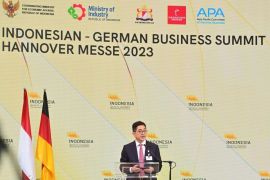To that end, the chamber, along with the government would organize an Indonesia Regional Business Summit (IRBS) in Bali on June 27-29, 2012, he said here on Sunday.
"IRBS 2012 is an effort to familiarize the public with the government`s program about Indonesian economic transformation and regional economic empowerment through the acceleration and expansion of Indonesia`s economic development," he said.
He said IRBS 2012 was also an integral part of the government`s efforts to create the country`s vision 2025, namely a self-reliant, advanced, just and prosperous community, by developing regional economic potentials in six economic corridors, national connectivity integrated locally and linked globally to strengthen the capability of human resources and science and technology in support of main programs in each economic corridor.
On the investment target of Rp2,600 trillion for 2012, he said the figure would come from gross fixed capital formation or physical investment in the country which was expected to reach Rp2,300 trillion at the end of this year.
Of the total, Rp240 trillion would come from foreign investment and domestic investment recorded by the Investment Coordinating Board (BKPM) throughout 2011, he said.
Meanwhile, BKPM has set the target of investment for 2012 at Rp283.5 trillion consisting of foreign investment worth Rp204.1 trillion and domestic investment worth Rp79.4 trillion.
As such, he added the government could form fixed capital of Rp10,000 trillion between 2009 and 2014.
Through the conference, Bambang said the central government and regional administrations could directly offer infrastructure projects in their respective regions to investors.
Apart from that, the exhibition could also serve as effective promotion means to introduce regional potentials to foreign parties as well as to assess the extend to which development process in the region had made progress to all layers of the community as part of efforts to evaluate development gains all the time, he said. (*)
Editor: Aditia Maruli Radja
Copyright © ANTARA 2011











